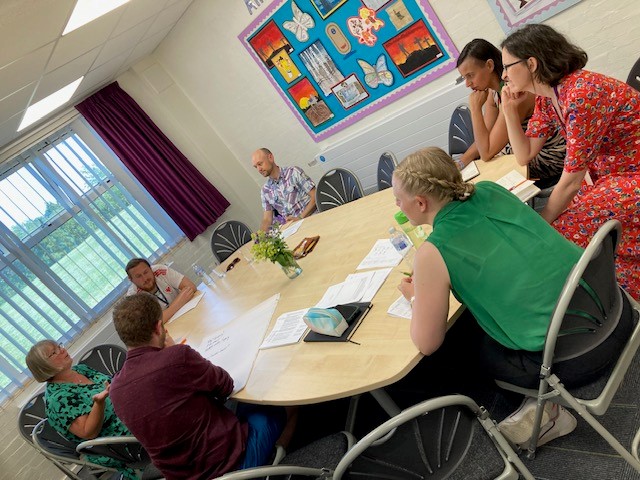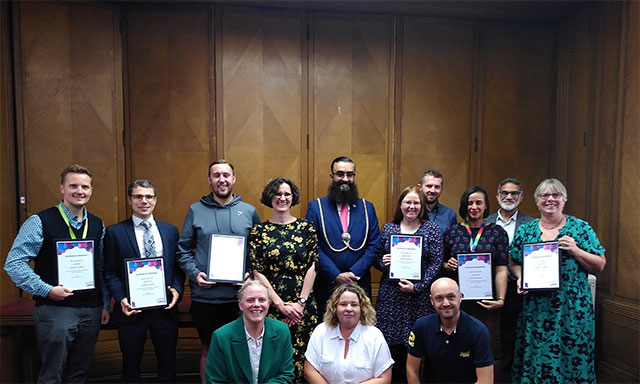Schools in Luton have developed climate action plans for the first time, with support from a new scheme from Luton Council.
Summary
Schools in Luton have developed climate action plans for the first time, with support from a new scheme from Luton Council. The Climate Action Teacher Champion (CATCh) programme trains nominated teachers to identify opportunities for environmental action in their schools. Teachers share their experiences and learn from each other, and then they write up an action plan with one-to-one mentoring from environmental experts (‘equippers’).
The challenge
Schools are well placed to help facilitate climate action within school settings but also influence behaviour in the wider community. The challenge comes in helping schools overcome barriers to action, where teachers may feel like they lack support or need tools to help inspire and encourage both staff and students. Schools also have the challenge of adapting to an ever ‘greener’ curriculum, with new opportunities to engage students on topics such as climate change and sustainability.
The scheme is funded by the UK Shared Prosperity Fund and delivered by Luton Council's Climate Change team with support from the University College London Climate Action Unit, Youth Network CIC and Groundwork East. The programmes initial development by UCL’s Climate Action Unit allows for emphasis to be placed on the psychology of the challenges that schools may face in undertaking an action plan.
Benefits include helping schools and students take action to lower their carbon impacts both at school and home. 8,294 tonnes of CO2e was produced by schools where Luton Council has direct control or influence (LBC Anthesis Report, 2020). Action planning can start the process of identifying areas for schools to take action, whilst also inspiring positive action (e.g. helping reduce reliance on car journeys and the switch to active travel means for getting to school).
The solution
Schools are provided with learning sessions on the psychology of climate action and bespoke sessions on how to start taking action in different ‘pillars’ (such as transport, and biodiversity). Local case studies are used to inspire and highlight routes to overcoming barriers to taking action. Teachers then receive 1:1 support to establish their action plan to help overcome barriers and provide signposting. Optional workshops are also available which bring together those who have taken part in the process before, and those who are currently taking part.
The impact
Each school has received a £1,000 bursary for completing the programme to further enable them to meet goals identified as part of their action plan. This can be paid to cover dedicated workshops/ training, contribution towards teachers’ costs to attend appropriate CPD opportunities to enhance their learning, renewable assessments and surveys for their school sites, to name a few options.
How is the new approach being sustained?
CATCh completed a successful pilot in the summer term, with six schools now putting their plans into action in the coming academic year. The next cohort of schools has been recruited for this new term, with a further six schools involved. Further cohorts to increase reach will be facilitated up to March 2025, where a strong network of school action planning will have been established. Optional workshops are now being run to help encourage engagement and networking between schools that have already completed the programme and those that are taking their first steps.
“When I was first looking into sustainability it felt massive – where do I start?” says Alex Martin, Assistant Head at Denbigh High School, who took part in the scheme. “This is a great programme to make you realise what you can achieve now, what you can achieve in the medium term, and how you can make sustainable systems for the future.”
Lessons learned
Regular sessions during cohorts are arranged between the council and equippers to discuss feedback and help evolve the offering to teachers. For example, after cohort one it was agreed that staff from different functions (e.g. senior leadership or business managers) should be encouraged to participate in or attend meetings. These meetings have also allowed equippers to refine and develop working documents and incorporate new local case studies as and when required. As expected, time for teachers to be involved with 1:1 lessons can be limited so equippers have needed to adapt to the demands of term-time and busy periods.
Contact
Images supplied by Luton Council.


